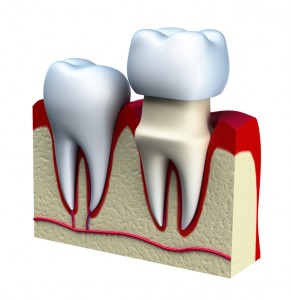Teeth caps – also commonly referred to as dental crowns – are used to repair many different kinds of dental problems. The method is considered highly effective and dentists often resort to placing teeth caps when a tooth cannot be restored by using dental fillings, inlays and onlays.
What Are Dental Caps?
Dental caps are almost like a prosthetic shell surrounding your natural tooth tissue. The cap usually covers the entire tooth (although not in all cases) and it becomes the visible, outer part of your tooth after treatment. Teeth caps are always made to fit an individual patient’s tooth and are typically made from either porcelain or metal, but can be made from resin as well. Alternatively, teeth caps can also be made using both metal and porcelain/ceramic , as is the case with crowns that are made of porcelain that’s been fused to metal.
While porcelain teeth caps resemble the color of natural teeth better than metal ones, they aren’t always the best choice for treatment in all cases. Your dentist will be able to provide you with advice for choosing the best crown to fix your problem.
Reasons to Get Teeth Caps

Dental caps are almost like a prosthetic shell surrounding your natural tooth tissue. The cap usually covers the entire tooth (although not in all cases) and it becomes the visible, outer part of your tooth after treatment.
Getting dental caps could be either for cosmetic or restorative reasons. Cosmetic reasons are often problems such as teeth looking too small, being severely discolored, or misaligned. As a restorative procedure, dental caps are used when a tooth is too decayed to support a filling, when there are cracks or chips in your teeth that are likely to get worse if other methods are used and to protect the remaining tooth tissue after a root canal has been performed. Other reasons patients want crowns might even include reducing pain in overly sensitive teeth, restoring teeth that have been worn down due to bruxism and to align a bite (as an alternative to orthodontic procedures).
Your dentist will be able to tell you whether getting teeth caps would be a viable option for fixing any dental problems you might be experiencing. As a general rule, dentists aren’t always going to be willing to perform the procedure for problems such as tooth sensitivity, as the procedure involves removing some tissue off the surface of the tooth. Most dentists try to preserve as much or your natural teeth as possible when fixing a problem and won’t be willing to place caps unless you haven’t exhausted all other options to reduce tooth sensitivity.
Procedure for Getting A Dental Crown
Depending on the reason you’re getting a dental crown, the procedure could vary somewhat, but in most cases you’ll be required to visit your dentist twice. On the first visit, dentists usually prepare the tooth by filling any areas that might need to be filled before placing a dental cap. After this, the remaining tooth tissue is shaved down to so that there’s enough space for the crown. Once your dentist is satisfied with the results, he or she will make an impression of your teeth by using either a digital scanner or a putty-like substance. To insure your cap will be a good fit, information such as the color of your teeth is also collected and sent to the lab technician who will make the crown.
 It takes a lab technician little while to make a good quality crown, and so your dentist won’t be able to fit the real crown on the first visit. Instead, you’ll be fitted with a temporary cap to maintain the shape of your tooth while waiting for the permanent one. Within a few weeks, you’ll return to your dentist so that the permanent crown can be fixed.
It takes a lab technician little while to make a good quality crown, and so your dentist won’t be able to fit the real crown on the first visit. Instead, you’ll be fitted with a temporary cap to maintain the shape of your tooth while waiting for the permanent one. Within a few weeks, you’ll return to your dentist so that the permanent crown can be fixed.
Once a dental cap has been placed, it’s rather likely to last you a lifetime, depending on the materials used and the skill of your dentist and lab technician. A tooth with a dental cap can be treated exactly like other teeth and requires daily brushing and regular checkups.



